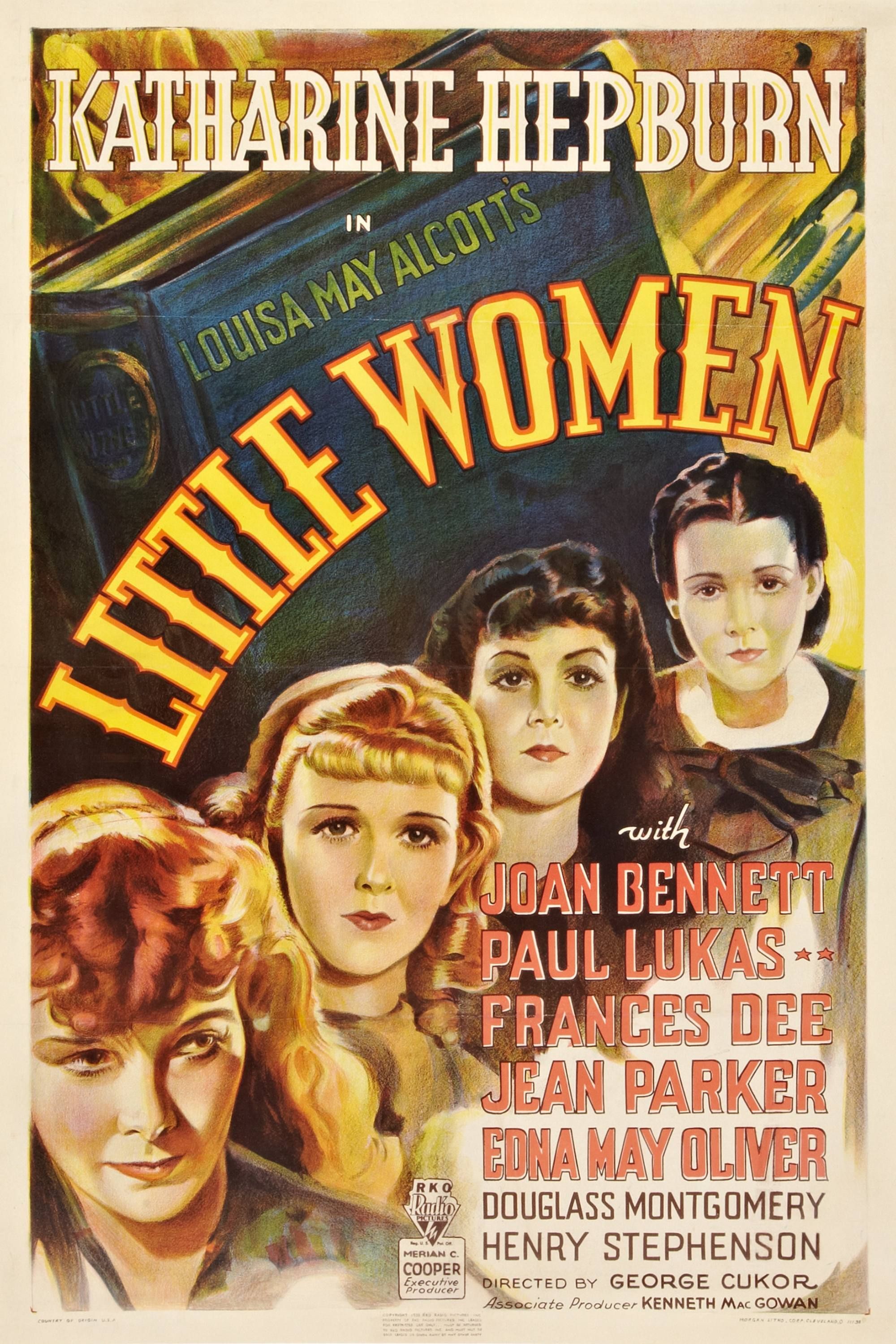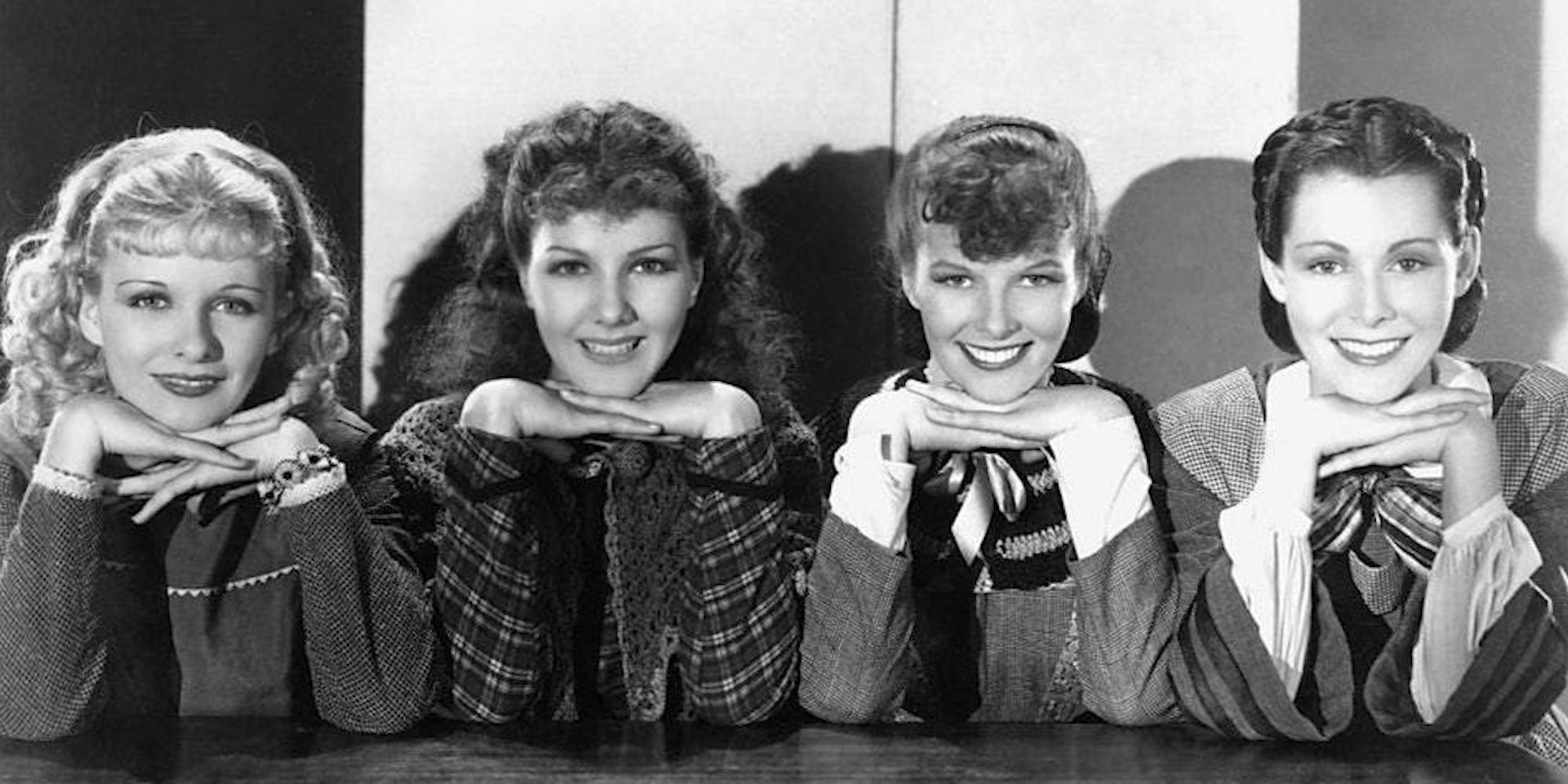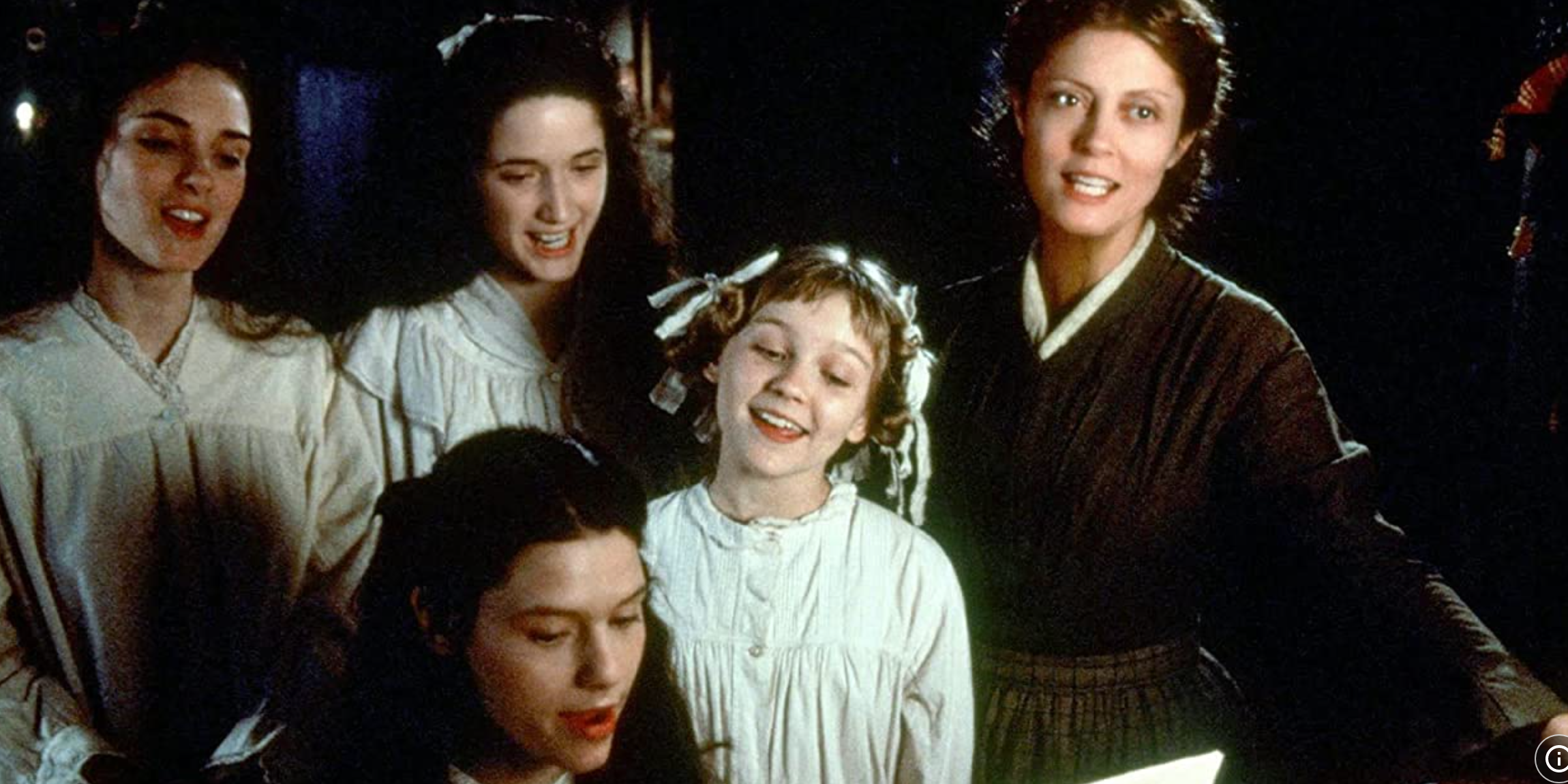
Originally published in two volumes in 1868 and 1869, Louisa May Alcott‘s seminal classic Little Women is easily one of the most important novels of the 19th century and an all-time Great American Novel. The plot centers on the now-iconic heroine Jo March, who, along with her three sisters — the older Meg and the young Amy and Beth — attempts to navigate the passage from girlhood to womanhood while enduring genteel poverty during the American Civil War. Little Women is often characterized as a biographical novel, with the late American literary historian Sarah Elbert considering it the birth of the “All-American girl” trope in her novel A Hunger for Home: Louisa May Alcott’s Place in American Culture.
The book was an instant success with critics and audiences. The first recorded film adaptation dates back to 1917, but sadly, both it and the 1918 silent version are now considered lost films. The earliest surviving version of Little Women is George Cukor‘s 1933 effort starring three-time Oscar winner Katharine Hepburn. Subsequently, three other adaptations followed in 1949, 1994, and 2019. Each version is a great snapshot of its age, adapting the novel’s basic premise but tailoring it to resonate with audiences of their time. Each has strengths and shortcomings, but one is clearly superior. This list will rank every major movie adaptation of Little Women based on how well they understand the story, how capably they translate it to a cinematic medium, and how successful they are at updating it for their time and place.
4
‘Little Women’ (1949)
Directed by Mervyn LeRoy
The second adaptation of the Alcott classic came out in 1949 and was directed by Mervyn LeRoy, best known as a prominent director in the 1930s and one of the producers of the 1939 sensation The Wizard of Oz. Filmed in Technicolor, the film stars June Allyson as Jo, two-time Oscar winner and cinematic icon Elizabeth Taylor as Amy, Margaret O’Brien as Beth, future Oscar nominee and Psycho star Janet Leigh as Meg, Peter Lawford as Laurie, and timeless femme fatale Mary Astor as Marmee.
1949’s Little Women can’t really stand on its own. Its script and score are directly taken from the 1933 version, which makes Allyson’s performance inevitably stand in the shadow of the mighty Katharine Hepburn. Allyson does her best to inject Jo with all the boisterous energy fans have come to know and love, but she sometimes comes across as too much; she’s tomboyish and assured but also blunt and lacks the perceptiveness and sensitivity that Hepburn and future Jo portrayals all have in spades. Taylor’s Amy fares much better, as the violet-eyed beauty is quite commanding, embracing Amy’s more stand-offish qualities and turning them into the real stars of the show. Lawford’s Laurie is also more noteworthy here, acting more like an actual three-dimensional character who plays an active role in Jo’s life besides being a perennial lovesick suitor. Overall, 1949’s Little Women is arguably the most forgettable of the adaptations, a somewhat lesser effort that failed to become a cultural touchstone and remained unfavorably compared to the 1933 version.
3
‘Little Women’ (1933)
Directed by George Cukor
1933 was the year Katharine Hepburn exploded into international prominence, winning an Oscar for her performance in Morning Glory. However, George Cukor’s version of Little Women played as big a part in her success. Hepburn stars as Jo March alongside Joan Bennett as Amy, Frances Dee as Meg, Jean Parker as Beth, Douglass Montgomery as Laurie, and Spring Byington as Marmee. The film
Depression-era audiences embraced this version of Little Women. The film greatly relies on the Marchs’ status of genteel poverty in an effort to relate to the struggles most audiences were also undergoing; everyday scenes of making do with what one had went a long way to endear the March sisters to the public. Still, 1933’s Little Women is all about Katharine Hepburn. More than any other version of the story, the 1933 movie lives and dies with Jo, to the point where the other sisters might as well be ornaments in the house. And yet, Hepburn is so iridescent in the role that one can’t help but understand the choice. The four-time Oscar winner embodies Jo’s spirited, challenging, overwhelming personality, bringing the character to life with the perfect blend of histrionic gusto and genuine vulnerability. For years after the film’s release, decades even, Hepburn remained the definitive portrayal of Jo March. The film is not without its flaws, and under the modern eye, its wholesomeness can become eye-rolling after a while. Yet, as a distinct depiction of a particular time and place, 1933’s Little Women is a brilliant adaptation of an already great novel.

- Release Date
-
November 24, 1933
- Director
-
George Cukor
- Runtime
-
115 Minutes
- Writers
-
Louisa May Alcott
, Victor Heerman
, Sarah Y. Mason
2
‘Little Women’ (1994)
Directed by Gillian Armstrong
Following LeRoy’s 1949 movie, almost fifty years passed before another version of Little Women hit the screen — there were, however, several TV adaptations, including one in 1978 with Susan Dey as Jo and William Shatner as Professor Biehr. Finally, in 1994, Gillian Armstrong assembled a new generation of young stars, this time led by ’90s icon Winona Ryder, to tell a new version of Alcott’s magnum opus. Claire Danes, Kirsten Dunst, and Trini Alvarado star as Beth, Amy, and Meg, with Oscar winners Susan Sarandon and Christian Bale as Marmee and Laurie.
1994’s Little Women is incredibly ’90s. Embracing the decade’s ideas of female liberation and empowerment, the plot frames Jo not as the free spirit of adaptations past but as a cerebral and hyper-focused career woman whose out-of-the-ordinary quality comes from a restless desire to escape domesticity. In her words, she just can’t give up her dreams to “go be a wife.” Marmee is also far more important here than in any other version, with Susan Sarandon taking a major role in the story while remaining a supporting figure in Jo’s story. Most notably, Professor Bhaer, often portrayed as an afterthought, takes a crucial role as a mentor and intellectual equal for Jo, a true companion who can challenge and push her to better herself in ways that Laurie could never. The film devotes a considerable portion to Jo and Bhaer’s romance, with Ryder and Gabriel Byrne sharing a distinct chemistry that might arguably be stronger than the one she shares with Bale’s Laurie. In fact, this version of the story might be the only one where you actually buy Jo and Bhaer’s connection. 1994’s Little Women might be the most overtly feminist adaptation of the story, framed under what passed for modern and progressive values in the ’90s.
Watch on PlutoTV
1
‘Little Women’ (2019)
Directed by Greta Gerwig
The 2019 version of Little Women is easily the best. Greta Gerwig‘s modern masterpiece is a successful reframing of the story, imbuing it with modern sensibilities while still capturing the spirit of the original text. Jo remains front and center, but the tale is very much about the four March sisters, their bond to each other, and their struggle to achieve their dreams and ambitions in a world that doesn’t give them any facilities. An incandescent Saoirse Ronan leads the cast as arguably the definitive version of Jo March: flawed, staunchly independent, fiercely loyal, and outspoken yet vulnerable, temperamental, and far from infallible. Ronan is a gift in the role, crafting a profound and instantly relatable figure that respects Alcott’s creation while still translating her into the 21st century.
The film also makes a brilliant choice of not presenting Amy as an antagonist. Aided by Florence Pugh‘s Oscar-nominated turn and Gerwig’s layered writing, Amy becomes as complex as Jo. They both are very much against their society’s limitations, even if they choose to fight them in different ways: whereas Amy finds a way to work within the system, Jo pushes back and challenges it. It’s a fascinating dynamic that is arguably the crux of the film, with Gerwig exploring different stages of girlhood on the difficult path to womanhood. A spectacular supporting cast — including Emma Watson as Meg (who finally gets some much-needed attention after being sidelined in so many adaptations), Eliza Scanlen as Beth, Laura Dern as Marmee, Timothée Chalamet as Laurie, and Meryl Streep as Aunt March — further elevates Little Women, turning it into a brilliant reinterpretation of the classic. Gerwig blends past and present, juggling comedy, romance, and drama, all in service of a timeless tale of sisterhood and the pain of leaving childhood behind in pursuit of independence and purpose. 2019’s Little Women understands the story better than any version, resulting in the best cinematic of this beloved literary masterwork.
Watch on Hulu








